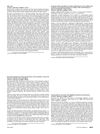 25 citations,
September 2015 in “Clinical Endocrinology”
25 citations,
September 2015 in “Clinical Endocrinology” Using 17-hydroxyprogesterone levels to diagnose nonclassic congenital adrenal hyperplasia can result in many incorrect diagnoses.
 March 2012 in “Journal of The American Academy of Dermatology”
March 2012 in “Journal of The American Academy of Dermatology” Hair casts are often mistaken for head lice, scalp pain in hair loss is linked to certain nerve factors, eyelash growth treatment is safe and effective, and nail shedding in children may follow hand-foot-mouth disease.
 72 citations,
July 2008 in “Dermatologic Therapy”
72 citations,
July 2008 in “Dermatologic Therapy” CCCA is a scarring hair loss condition mainly in African descent women, possibly caused by genetics and hairstyling, treated with gentle hair care and medications.
 97 citations,
July 2006 in “Dermatologic therapy”
97 citations,
July 2006 in “Dermatologic therapy” The document concludes that accurate diagnosis and personalized treatment are important for skin problems in women with PCOS.
 July 2022 in “Research Square (Research Square)”
July 2022 in “Research Square (Research Square)” Certain miRNAs may play a role in sheep hair follicle development, which could help improve wool production.
 January 2024 in “Frontiers in endocrinology”
January 2024 in “Frontiers in endocrinology” Treating early puberty with hormone therapy may increase the risk of polycystic ovary syndrome in adults.
15 citations,
October 2012 in “Journal of child neurology” The same genetic mutation in Sjögren-Larsson syndrome can lead to different levels of severity, suggesting other factors influence the symptoms.
 66 citations,
March 2018 in “British journal of dermatology/British journal of dermatology, Supplement”
66 citations,
March 2018 in “British journal of dermatology/British journal of dermatology, Supplement” An imbalance between certain immune cells is linked to a chronic skin condition and may be influenced by obesity, smoking, and autoimmune issues.
 5 citations,
January 2018 in “Skin Pharmacology and Physiology”
5 citations,
January 2018 in “Skin Pharmacology and Physiology” Curcuma aeruginosa extract lotion significantly reduces underarm hair growth.
 36 citations,
January 2006 in “Veterinary Dermatology”
36 citations,
January 2006 in “Veterinary Dermatology” Cyclosporin effectively and safely treated skin diseases in three pets with no side effects.
 March 2024 in “Research Square (Research Square)”
March 2024 in “Research Square (Research Square)” Scalp cooling therapy helps preserve hair during chemotherapy for most patients.
3 citations,
August 2021 in “European journal of medical research” Microbial biofilms may cause red scrotum syndrome.
 6 citations,
September 2010 in “Current Urology Reports”
6 citations,
September 2010 in “Current Urology Reports” New treatments for long-lasting erections improve outcomes but must be timely to avoid lasting damage.
3 citations,
January 2021 in “Oxidative Medicine and Cellular Longevity” Nrf-2-modified stem cells from hair follicles significantly improve ulcerative colitis in rats.
 14 citations,
March 2022 in “Clinical Endocrinology”
14 citations,
March 2022 in “Clinical Endocrinology” The document concludes that a systematic approach is crucial to identify causes of androgen excess in women beyond the most common cause, Polycystic ovary syndrome (PCOS).
 9 citations,
July 1995 in “Veterinary Clinics of North America: Small Animal Practice”
9 citations,
July 1995 in “Veterinary Clinics of North America: Small Animal Practice” The document concludes that hair loss in cats is caused by various factors, including allergies, mites, infections, and hormonal issues, with treatments varying accordingly.
 67 citations,
January 2007 in “Environmental health perspectives”
67 citations,
January 2007 in “Environmental health perspectives” A woman's health issues were caused by arsenic poisoning from kelp supplements.
 October 2023 in “Journal of Drug Delivery Science and Technology”
October 2023 in “Journal of Drug Delivery Science and Technology” Electrospun nanofibers might be a promising new treatment for hair loss.
 August 2022 in “Nature Biotechnology”
August 2022 in “Nature Biotechnology” Drug approvals slowed in 2Q22, but notable drugs like Amvuttra, Camzyos, and Olumiant were approved.
 February 2023 in “IntechOpen eBooks”
February 2023 in “IntechOpen eBooks” Testosterone replacement therapy helps manage deficiency and has various methods, but requires careful monitoring to avoid side effects.
 1 citations,
January 2008 in “Elsevier eBooks”
1 citations,
January 2008 in “Elsevier eBooks” The document concludes that various disorders can cause hair loss in dogs, each requiring different treatments, and some may heal on their own.
 3 citations,
April 2019 in “Journal of Dermatological Treatment”
3 citations,
April 2019 in “Journal of Dermatological Treatment” Caffeine shows promise for treating some types of hair loss, but more research is needed.
 January 2024 in “Annals of dermatology/Annals of Dermatology”
January 2024 in “Annals of dermatology/Annals of Dermatology” Weight loss can cause temporary hair loss, especially in women and older adults.
 2 citations,
July 2012 in “Journal of Pediatric and Adolescent Gynecology”
2 citations,
July 2012 in “Journal of Pediatric and Adolescent Gynecology” A 12-year-old girl with very high testosterone and insulin resistance improved with birth control pills, suggesting PCOS can cause high testosterone without tumors.
 January 2021 in “Springer eBooks”
January 2021 in “Springer eBooks” Different rheumatological diseases can cause specific skin problems.
 17 citations,
December 2013 in “Journal of Investigative Dermatology Symposium Proceedings”
17 citations,
December 2013 in “Journal of Investigative Dermatology Symposium Proceedings” Bimatoprost is safe and effective for treating eyelash loss caused by chemotherapy.
 1 citations,
January 2021 in “Skin appendage disorders”
1 citations,
January 2021 in “Skin appendage disorders” A woman with alopecia regrew her hair after taking a higher dose of tocilizumab.
 14 citations,
January 2018 in “Advances in Clinical Chemistry”
14 citations,
January 2018 in “Advances in Clinical Chemistry” The document concludes that hormonal biomarkers are key for diagnosing hyperandrogenemia in women and hypogonadism in men.
 24 citations,
January 2020 in “JAAD Case Reports”
24 citations,
January 2020 in “JAAD Case Reports” Topical metformin helped regrow hair in two women with a hard-to-treat scarring hair loss condition.
7 citations,
May 2021 in “Seizure” Some antiseizure medications can cause cosmetic problems like hair loss, excessive hair growth, acne, and gum overgrowth.

























